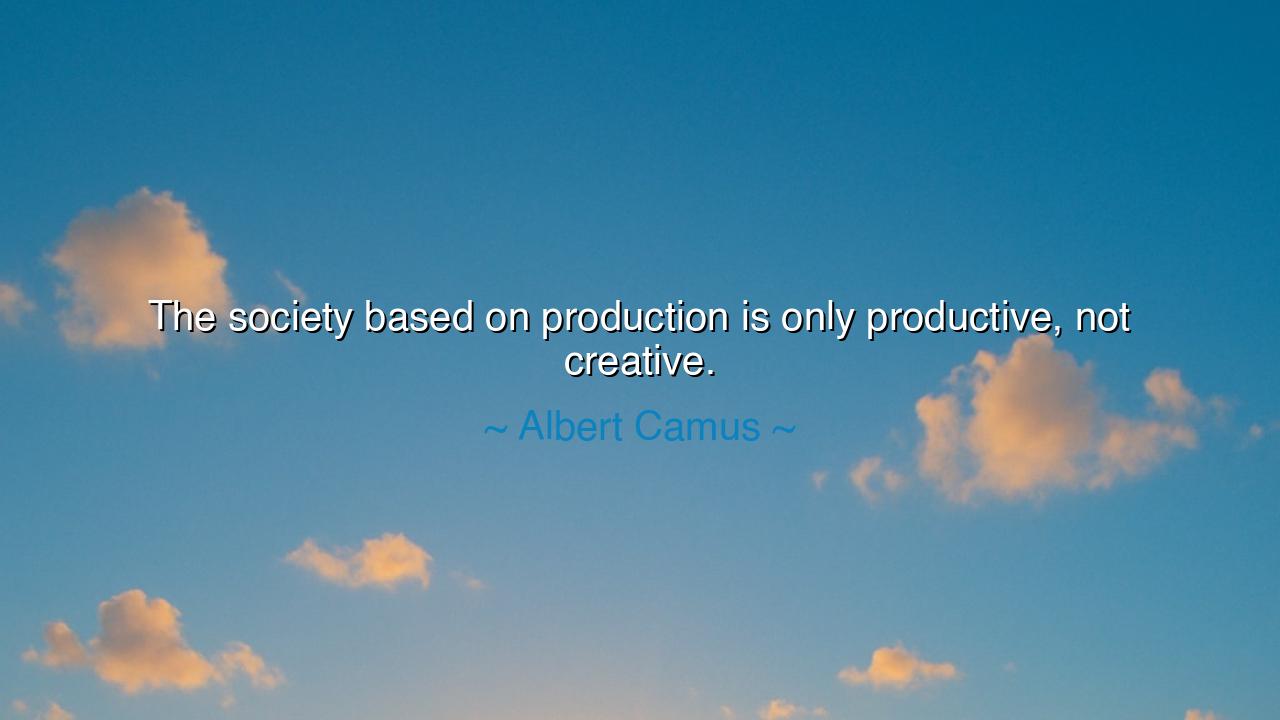
The society based on production is only productive, not creative.






Hear the words of Albert Camus, philosopher of rebellion and seeker of truth: “The society based on production is only productive, not creative.” In this saying he unveils a wound of the modern age: a world that measures itself by output, by machines, by numbers, may fill its barns and multiply its wealth, yet lose the very spark of the human spirit. Productivity is the labor of hands and engines, but creativity is the labor of the soul. One builds for survival, the other for meaning. When society worships production alone, it becomes rich in things but poor in imagination, full of goods yet empty of purpose.
The ancients knew this divide. In Athens, farmers and craftsmen produced bread and tools to sustain life, but the city’s greatness lay not in its markets, but in its theaters, its philosophy, its sculpture, its bold search for wisdom and beauty. A purely productive society can clothe and feed its people, but only a creative society can elevate them. Camus warns us that to reduce human life to production is to chain the spirit, and to forget that man is more than a worker—he is also an artist, a thinker, a dreamer.
Consider the story of the Industrial Revolution. Factories roared, machines multiplied goods, wealth grew—but in the slums of London and Manchester, men, women, and children worked like cogs in the very machines they served. Society became immensely productive, yet in those early years, creativity withered under soot and exhaustion. It was only when reformers, poets, and visionaries began to demand dignity, education, and the nurturing of the mind that balance returned. This history embodies Camus’ teaching: production without creativity is barren; wealth without imagination is hollow.
And yet, Camus does not reject production itself. He sees that man must till the earth, forge steel, and build shelter. But he reminds us that society must not stop there. If all effort is bent toward efficiency, speed, and quantity, then beauty dies. A society that counts only coins and measures only profits blinds itself to music, to poetry, to invention, to the higher pursuits that make life more than survival. For the creative spirit is what makes civilization truly human.
The meaning is profound: creativity cannot be measured on a ledger, but it sustains the soul of a people. A song sung in a village, a child’s drawing, a poet’s words whispered to a friend—these enrich society more deeply than endless production. The pyramids of Egypt astonish us not because they were efficient, but because they were imaginative. The cathedrals of Europe inspire us not because they produced wealth, but because they reached toward heaven. Creation gives meaning to production, just as the soul gives life to the body.
The lesson for us is clear: do not become slaves of production alone. In your own life, work diligently, yes, but do not neglect the flame of creativity. Read, write, paint, sing, or build something not because it is useful, but because it is beautiful. Encourage children not only to labor but to dream. Demand of society not only jobs and goods, but also art, music, literature, and spaces where imagination may breathe. For without creativity, productivity becomes a cage, and men forget why they labor at all.
Therefore, O listener, remember Camus’ words: “The society based on production is only productive, not creative.” Guard against a world that counts only what can be weighed and sold, and forgets the treasures that cannot be priced. Choose to live not only as a producer of things, but as a creator of meaning. Let your life itself be a work of art, woven from both necessity and imagination.
And so let this wisdom endure: production sustains the body, but creativity sustains the soul. Only when both are honored can a society be truly alive.






AAdministratorAdministrator
Welcome, honored guests. Please leave a comment, we will respond soon